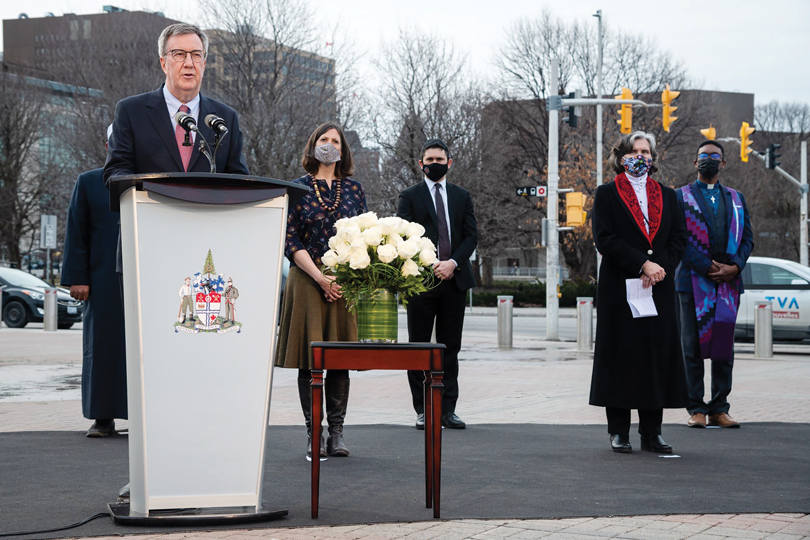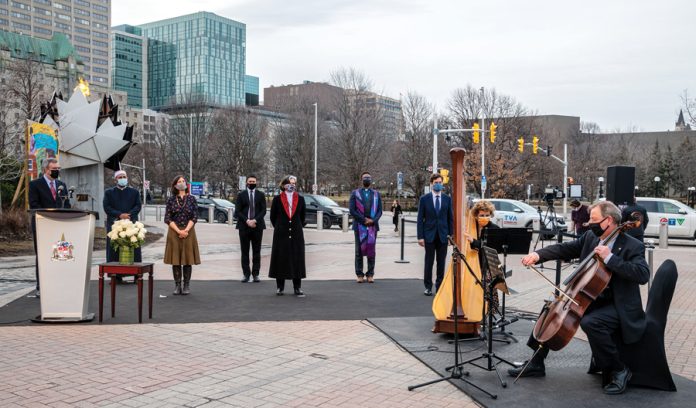By Charlie Senack
COVID-19 restrictions have forced religious institutions to keep their doors shut for a greater part of the year. With physical distancing being practiced and large gatherings not permitted, services and events have had to shift online.
With Easter and Passover services being celebrated on livestreams and Zoom sessions again this year, Kitchissippi Times spoke with the Jewish Federation of Ottawa and Parkdale United Church to see how they are coping one year later.
A request was sent to the Ottawa Muslim Association to discuss how Ramadan is being observed this year, but Kitchissippi Times did not hear back by the time of publication.
Jewish Federation of Ottawa
Passover, one of the biggest religious holidays in Judaism, was one of the first celebrations that had to be altered because of restrictions caused by the virus. Now for the second year in a row, it’s being celebrated virtually.
“Last year was so, so lonely for people and I don’t think any of us imagined that we would have to do it again,” said Andrea Freedman, president and CEO of the Jewish Federation of Ottawa.
“I think people are struggling with it a little bit more this year, because things are opening up a little bit more,” she added. “It’s really hard because people didn’t think they would be separated from their families for a second year in a row.”
Freedman said typically at Passover, she and the rest of her family gather in Montreal, where she was born, to celebrate. But because of restrictions, she will be celebrating from her Ottawa home again this year.
With Ottawa now in the red zone and with talks of moving the city into grey, which would bring along with it more lockdown measures, almost all Passover activities were held virtually this spring. Some services were held in person at synagogues, but with only a few people inside.
“With everything, you have to look for the COVID[-19] silver linings, and so while there is isolation in being away from loved ones, what it does is force people to observe the holiday and give it more thought on how to be meaningful,” said Freedman. “It forces us to look for meaning where we used to take it for granted. We now have to create it ourselves.”
This Passover, Rabbi Bulka was on the minds of many celebrating the occasion. Bulka, a well-known and liked Ottawa Rabbi who has given so much to the city over the years, announced in January that he had been diagnosed with a life-threatening and late-stage cancer.
Since his diagnosis, synagogues all across Ottawa have held events and celebrations in Bulka’s name to create more positive change. Most recently, a third round of kindness calls was started to check in on people in the community who are feeling isolated and lonely because of the pandemic.
Freedman, who has spent a large portion of her working life in direct contact with Rabbi Bulka, said it’s been a highlight of her life. She also says Bulka’s kindness has been spread to not only people in Ottawa, but also his friends across the world.
“There have been a ton of initiatives, but I do want to focus on kindness because it’s something Rabbi Bulka has taught us all really well,” said Freedman. “Rabbi Bulka has a way of making everybody feel better. In every conversation, in every email he exchanged, he looked for ways to make you feel good.”
Now those acts of kindness are being spread through others in a ripple effect in Bulka’s name.

Mayor Jim Watson speaks at the interfaith service on March 25. The mayor was joined by Dr. Vera Etches, Chief Wendy Jocko, Mr. Francois Couillard, Reverend Dr. Anthony Bailey, Rabbi Idan Scher and Imam Samy Metwally. Photo courtesy of the City of Ottawa.
Parkdale United Church
The Parkdale United Church was forced to close its doors to the public when the COVID-19 pandemic began. While some restrictions were eased in the summer, the majority of their services have continued to be held virtually.
With the rate of new COVID-19 infections rising around Easter this year, Reverend Anthony Bailey said many of the congregation’s members didn’t feel comfortable returning to in-person services — a decision which was made even easier when Ottawa entered the red zone.
But while people have to celebrate from home this year, Parkdale United Church has planned a whole week of virtual activities for the Christian traditions of Good Friday, Holy Week and Easter. They include Bible studies, programming for the kids, a Palm Sunday celebration and services, to name just a few.
“We have teamed up with St. Stephen’s Presbyterian Church, as we have in other years, for a service on Good Friday, and then one of the things we do is have a 24-hour vigil leading up to Easter morning,” said Rev. Bailey. “Normally, we would have people coming into our chapel every hour, even through the night, to pray continually for 24 hours for the world, but this year it also has to be virtual. People have signed up for slots throughout the day and throughout the night to keep up the momentum.”
With vaccination efforts now underway, Bailey said the congregation is looking forward to the day they can gather in person again. Until then, the church has purchased new equipment to improve the quality of virtual services people are receiving.
Bailey said he feels that even when COVID-19 restrictions are lifted, some members will choose to continue watching the services online.
“There are some members who say even after COVID[-19] they might come in occasionally, but because of their age or health issues, they can now enjoy the service virtually,” he said. “Because of the effectiveness of technology, I think we are going to see sort of a hybrid in our congregational experience.”
On March 25, Bailey was part of an interfaith service at Ottawa’s City Hall which was held to recognize the one-year anniversary of the first COVID-19 death in the city. Since last spring, there have been over 450 deaths caused by the virus in Ottawa.
Bailey said he was humbled to be a part of the service and that he used it as an opportunity not only to mourn the lives lost from COVID-19, but also to mourn the long list of issues facing society that became even more apparent in 2020.
“What has been disappointing and hard, but essential also, is that COVID[-19] has exposed things that have been there all along,” he said. “That has to do with systemic racism and injustice; that has to do with what was exposed in long-term care homes; that has to do with the way Aboriginal people have been treated for generations.”
“We have to mourn some of the systems and policies, and when mourning, we have to create change,” added Bailey. “We have to do better.”
